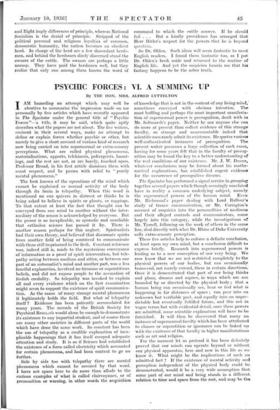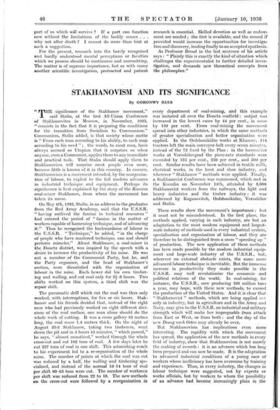PSYCHIC FORCES : VI. A SUMMING UP
By THE HON. MRS. ALFRED LYTTELTON
IAM hazarding an attempt which may well be abortive to summarise the impression made on me personally by five articles which have recently appeared in The Spectator under the general title of " Psychic Forces "—a title, it may be said, which quite aptly describes what the papers are not about. The five writers, eminent in their several ways, make no attempt to define or explain forces whether psychic or other, but merely to give a short account of various kind of research now being carried on into supernormal or extra-sensory perceptions. What are called physical phenomena, materialisation, apports, telekinesis, poltergeists, haunt- ings, and the rest are not, or are barely, touched upon. Professor Broad, in his first article dismisses them with scant respect, and he passes with relief to " purely mental phenomena."
The best known of the operations of the mind which cannot be explained as normal activity of the body through its brain is telepathy. When this word is mentioned no one quivers in distrust or thinks he is being asked to believe in spirits or ghosts, or rappings. To that extent at least the fact that thought can be conveyed from one mind to another without the inter- mediary of the senses is acknowledged by everyone. But the power is so inexplicable, so sporadic and unreliable that orthodox science has passed it by. There is another reason perhaps for this neglect. Spiritualists had their own theory, and believed that discarnate spirits from another field of being contrived to communicate with those still imprisoned in the flesh. Constant reference was, indeed still is, made to the mysterious conveyance of information as a proof of spirit intervention, but tele- pathy acting between medium and sitter, or between one part of:an automatist's mind and another part, was a less fanciful explanation, involved no tiresome or superstitious beliefs, and did not expose people to the accusation of foolish credulity. So telepathy was invoked to explain all and every evidence which on the first examination might seem to support the existence of spirit communica- tion. As the cause of many strange mental phenomena it legitimately holds the field. But what of telepathy itself ? Evidence has been patiently accumulated for many years. The records of the British Society for Psychical Research would alone be enough to demonstrate its existence to any impartial student, and of course there are many other societies in different parts of the world which have done the same work. So constant has been the use of telepathy as a credible explanation of inex- plicable. happenings that it has itself escaped adequate attention and study. It is as if Science had established the existence of a force called electricity which accounted for certain phenomena, and had been content to go no further.
Side by side too with telepathy there are mental phenomena which cannot be covered by that word. I have not space here to do more than allude to the curious examples of what is called clairvoyance, or of premonition or warning, in other .words the acquisition of knowledge that is not in the content of any living mind,' sometimes conveyed with obvious intention. The most baffling and perhaps the most important manifesta- tion of supernormal power is precognition, dealt with in Mr. Saltmarsh's paper. Neither he nor anyone else can do more at present than collect evidence of this strange faculty, so strange and unaccountable indeed that scientific men rarely admit its existence. He quotes various well-authenticated instances of precognition. The present writer possesses a large collection of such cases, having for some years felt that in the faculty of precog- nition may be found the key to a better understanding of the real conditions of our existence. Mr. J. W. Dunne, whatever conclusions may be formed about his mathe- matical explanations, has established cogent evidence for the occurrence of precognitive dreams.
The Spectator has performed a signal service in grouping together several papers which though seemingly unrelated have in reality a common underlying subject, namely the supernormal powers of the human mind. Even Mr. Richmond's paper dealing with Lord Balfour's study of trance communication, or Mr. Carington's account of enquiries into the personalities of mediums and their alleged controls and communicators, come largely into this category, while the investigations of Mr. Tyrrell, following on the work of others in the same line, deal directly with what Dr. Rhine of Duke University calls extra-sensory perception.
These five articles help to enforce a definite conclusion, at least upon my own mind, but a conclusion difficult to express briefly. Research into supernormal powers is leading us to a new conception of our very being. We now know that we are not restricted completely to the physical powers of our bodies, but can occasionally transcend, not merely extend, them in certain directions: Once it is demonstrated that part of our being thinks and plans, dreams and aspires, in ways which are not bounded 'by or directed by the physical body ; that a human being can occasionally see, hear or feel what is happening in far distances of space ; can peer into an unknown but verifiable past, and equally into an unpre- dictable but eventually fulfilled future, and this not in vague terms but with evidential detail, once these powers are admitted, some scientific explanation will have to be furnished. It will then be discovered that many an instance of supernormal faculty which has been attributed to chance or superstition or ignorance can be linked up with the existence of that faculty in higher manifestations such as art and religion.
For the moment let us pretend it has been definitely proved that our minds can operate beyond or without our physical apparatus, here and now in this life as we know it. What might be the implications of such an admitted fact ? If the existence of mental activity and perception independent of the physical body could be demonstrated, would it be a very wide assumption that some part of our mind and being stands in a different relation to time and space from the rest, and may be the part of us which will survive ? If a part can function now without the limitations of the bodily senses . why not after death ? I cannot do more than hint at such a suggestion.
For the present, research into the barely recognised and hardly understood mental perceptions or faculties which we possess should be 'continuous and unremitting. The matter is of supreme importance, but as with many another scientific investigation, protracted and patient research is essential. Skilled devotion as well as endow- ment are needed ; .the first is available; and the second if provided would increase the opportunities for investiga- tion and discovery, leading finally to an accepted synthesis. - As Professor Broad in the -last sentence of his article says : " Plainly this is exactly the kind of situation which challenges the experimentalist to further detailed inves- tigation, and demands new theoretical concepts from the philosopher."











































 Previous page
Previous page